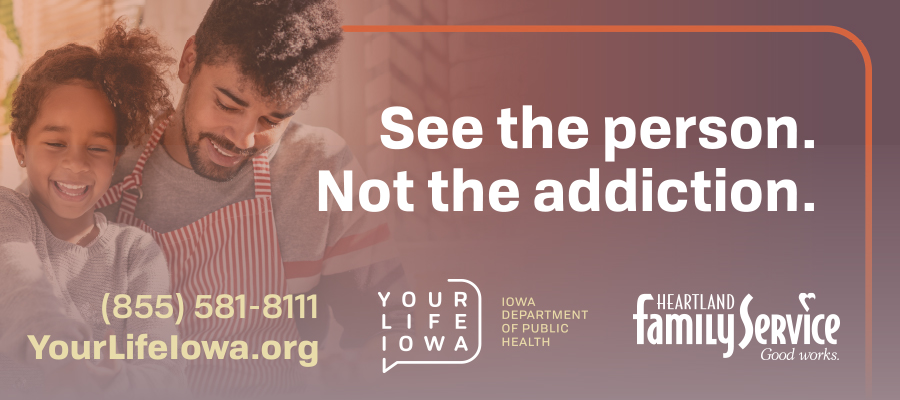Prevention
At Heartland Family Service, we believe Prevention is as important as treatment. We believe in taking action to empower our community and youth to remain healthy and productive. The services we provide are research-based and evidence-informed, with the assurance that all people have access to quality services that are culturally responsive and
trauma-informed. We utilize the Substance Abuse and Mental Health Services Administration’s (SAMHSA) six prevention strategies to guide all our prevention work in Iowa and Nebraska, as well as the Strategic Prevention Framework (SPF) Steps to guide our prevention plan overall.
Our Prevention goal is to promote youth development, reduce risk-taking behaviors, build assets and resilience, and prevent problem behaviors throughout a person’s lifetime. We utilize evidence-based prevention strategies to provide primary prevention services on substance use and problem gambling to the community. Prevention is comprehensive and involves utilizing a variety of strategies to be effective.
Heartland Family Service Prevention collaborates through with other community prevention services to leverage resources and make the greatest impact on increasing perception of harm of substances and reducing substance use in our community. Through our services in both Nebraska and Iowa and through our active involvement in prevention coalitions and community networks, Prevention Means Progress (PMP) and Metro Omaha Tobacco Action Coalition (MOTAC) we work to reduce substance misuse in our community through education, outreach, and legislative education/advocacy.
Heartland Family Service actively participates with the following coalitions to provide community Prevention services:
Metro Omaha Tobacco Action Coalition (MOTAC)
MOTAC is a is a dynamic coalition comprised of more than 50 health-related individuals, organizations, and educational groups that strive to strengthen tobacco control and prevention efforts in the metro area. This coalition addresses tobacco-related issues through public education and community action, relying on community involvement to accomplish its mission.
Prevention Means Progress (PMP)
PMP is a community coalition with more than 50 partners in both Iowa and Nebraska. The vision of PMP is empowering people to take action against substance use and the culture values everyone’s contribution to prevention, treatment, and recovery. The coalition provides information, education, and awareness of substance use through events, presentations in schools and workplaces, and legislative advocacy. PMP’s unique Me360 presentations are offered to middle and high schools in the local service area and are designed to meet the substance use prevention needs of each individual school or district.
Areas Served
MOTAC | Nebraska: Douglas County
PMP | Iowa: Harrison, Mills, & Pottawattamie Counties Nebraska: Douglas & Sarpy Counties
Problem Gambling | Iowa: Harrison, Mills, & Pottawattamie Counties
Eligibility & Fees
None
Funding: The Heartland Family Service Prevention program in Iowa is part of the Iowa Department of Public Health (IDPH) Integrated Provider Network, with services funded by the IDPH and the U.S. Dept. of Health and Human Services Substance Abuse and Mental Health Services Administration.
Learn more about Tobacco Prevention
Iowa State Opioid Response (SOR) Project
Heartland Family Service is participating in the Iowa State Opioid Response (SOR) Project funded by the Iowa Department of Public Health -“Promoting, Protecting, and Improving the Health of Iowans”. Iowa’s SOR Project is consistent with IDPH’s “recovery-oriented system of care” model that integrates substance use disorder prevention, treatment, and recovery support services. (research and data developed by the Iowa Department of Public Health)
About the Opioid Epidemic in Iowa: The opioid epidemic continues to take a toll in Iowa, with a 30% increase in opioid deaths since 2019. National and Regional rates of opioid misuse have decreased in recent years, rates in Iowa have increased, surpassing those of the rest of the Nation — The lives of Iowans are positively impacted when communities support prevention, treatment, and recovery services: visit YourLifeIowa.org
Getting Treatment: The SOR Project aims to increase access to medication-assisted treatment (MAT) for the treatment of opioid use disorder, reducing opioid overdose related deaths through provisions of evidence-based prevention, treatment, and recovery activities for opioid use disorder. SOR will also provide recovery support services — helping people enter into and navigate systems of care, remove barriers to recovery, stay engaged in the recovery process, and live full lives in the community. Naloxone can reverse the life-threatening respiratory depression associated with opioid overdose — In Iowa you can access Naloxone at your Pharmacy without a prescription.
Language Matters: Addiction-related stigma affects individuals, families, and communities. It is with a paradigm shift in the language we use and the approaches we take, that we can truly connect with those who most need to hear our message, asking “what happened to you” instead of “what’s wrong with you”.
Together we can see the person, not the addiction, and we can save lives.
So everyone can.
Available SOR Trainings
General Overdose Education, Prevention Strategies, and Naloxone Administration to Address Opioid Use at the Community Level
Those who should attend:: First Responders, local organizations, businesses, civic groups, clients/families, SUD staff, prison and probation staff, educators and school personal, homeless shelter staff, mental health providers. Note: (First Responders taking this training will have access to receive NARCAN kits through the IDPH)
Understanding Psychostimulants-Including information on Cocaine and Methamphetamine
Those who should attend: Clients and families, first responders, healthcare providers, businesses, local organizations, civic groups, prison and probation staff, mental health providers.
Understanding Stigma, Impacts, and Consequences with Substance Use Disorders
Those who should attend: First responders, healthcare providers, local businesses-civic groups-organizations, prison and probation staff, SUD staff, drug court coordinators.
Trauma Informed Care for First Responders
(Can be adjusted for pharmacists, healthcare providers/prescribers, prison and probation staff)
Medication Assisted Treatment (MAT)
Those who should attend: First Responders, healthcare providers, prison and probation staff, drug court coordinators, homeless shelter staff.
We understand that every group is unique, with its own strengths and needs — we will work with you to integrate a training that supports your efforts in our community
For questions and/or to request a training contact:
Christy Hagen, MSW | Heartland Family Service SOR Prevention Specialist | 712.325.5638









